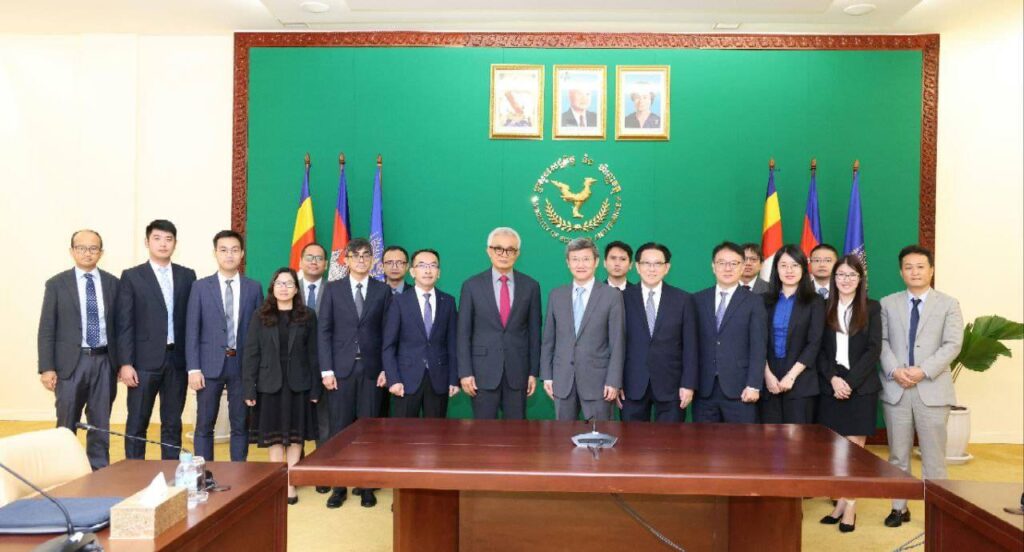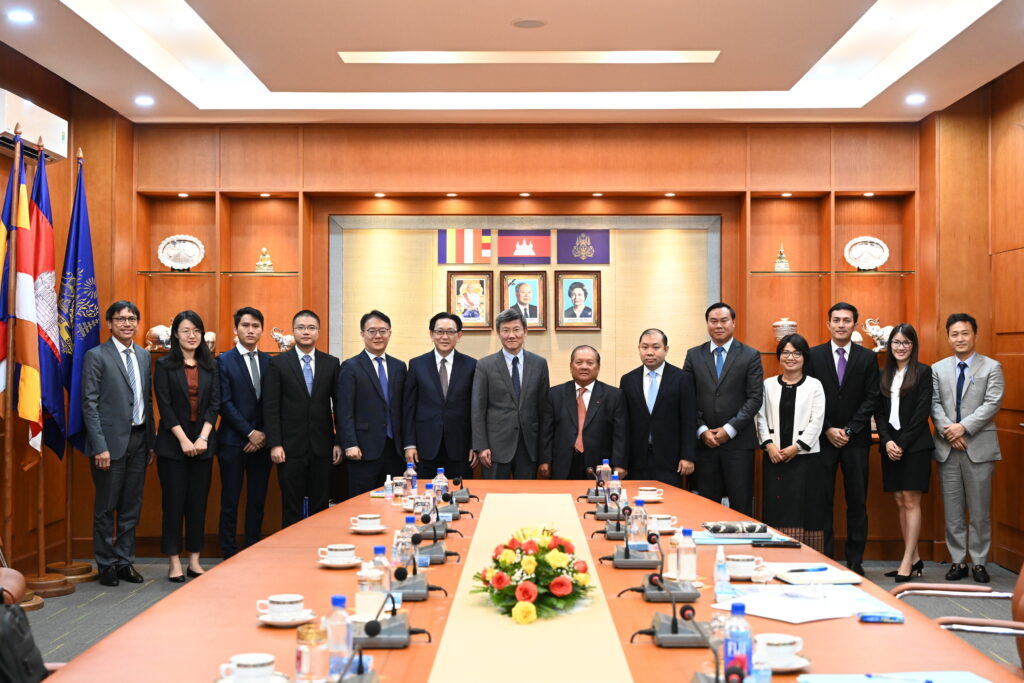
SINGAPORE, September 19, 2023 – Cambodia’s economy continues to recover solidly on the back of a strong rebound in the services sectors. However, the manufacturing sector, especially the garment sector, struggled with external headwinds. Cambodia’s growth outlook is highly contingent on external risks, particularly a weakening in the global economic recovery and a renewed surge in global commodity prices. The new government should put a higher priority on restoring monetary and fiscal buffers post-pandemic while strengthening its commitment to structural reforms, which will help improve the long-term growth potential of the economy.
This preliminary assessment was made by the ASEAN+3 Macroeconomic Research Office (AMRO) after its Annual Consultation Visit to Cambodia from September 4 to 14, 2023.
The mission was led by AMRO Principal Economist Jinho Choi. AMRO Director Kouqing Li and Chief Economist Hoe Ee Khor participated in the policy discussions. The discussions focused on Cambodia’s recent macroeconomic developments and outlook, risks and vulnerabilities, and policy recommendations to ensure sustainable growth and financial stability.
Economic developments and outlook
“The Cambodian economy is projected to grow by 5.3 percent in 2023, up from 5.2 percent in 2022. A robust tourism recovery, alongside pent-up domestic consumption, will sustain the ongoing economic recovery,” said Dr. Choi. “Growth is expected to strengthen to 6.2 percent in 2024 on the back of resilient consumption and a recovery in garments exports, reflecting a turnaround in global manufacturing.”
Consumer price index (CPI) inflation spiked to an annual average of 5.3 percent in 2022 and eased significantly to 1.2 percent in the first half of 2023. Cambodia’s inflation dynamics tend to respond rapidly to changes in global food and oil prices, attributed to the significant share of food items in its CPI basket as well as its heavy reliance on imported oil. For the whole of 2023, CPI inflation is projected to decline to 2.3 percent, before picking up to 2.7 percent in 2024, in tandem with stronger economic growth.
The current account deficit narrowed significantly to 1.9 percent of GDP1 in the first quarter of 2023 from 25.7 percent of GDP in 2022, on the back of a sharp decline in goods imports, sustained inflows in remittances and a robust recovery in tourism. Meanwhile, despite global financial tightening, foreign direct investment (FDI) inflows remained resilient, standing at 11.6 percent of GDP in 2022 and 14.7 percent in the first quarter of 2023.
Risks, vulnerabilities, and challenges
Cambodia’s path toward a strong economic recovery could be derailed by several near-term external risks and domestic vulnerabilities.
External short-term risks stem from a faltering economic growth in China, the largest contributor to FDI and tourism. Cambodia could also be adversely affected by a sharper slowdown of its major economic partners such as the US and EU. A renewed surge in global oil and food prices, driven by a combination of heightened geopolitical tensions and a severe El Nino weather pattern, could cause Cambodia’s inflation to spike again.
A prolonged slump in the real estate sector could lead to financial distress and put pressure on the financial sector and the broader economy, particularly through the under-regulated shadow banking activities. Growing reliance on short-term external debt and non-resident bank deposits could cause the economy’s financial account to be vulnerable to a reversal in short-term funds.
As a perennial risk, extreme weather events and climate change transition could hinder potential growth unless effectively addressed.
Policy recommendations
Restoring fiscal space should remain a policy priority. The lessons learned from the pandemic have highlighted the importance of maintaining adequate fiscal space, enabling effective responses to unforeseen shocks. A strong fiscal position is essential to sustain confidence in a highly dollarized economy. Extraordinary spending measures to support vulnerable households during the pandemic should be phased out now that the economy is recovering robustly. The government’s new scheme to allocate 2-4 percent of current revenue for the newly established contingency fund is highly commendable as it will help rebuild the fiscal buffer.
The National Bank of Cambodia’s (NBC’s) stance toward gradual normalization of its monetary and macroprudential policy measures is appropriate. Considering the tight global financial conditions, the NBC should be flexible in restoring its reserves requirement ratios for the foreign currencies and/or the capital conservation buffer to avoid excessive tightening in liquidity. To strike a balance between the exchange rate stability and foreign reserve adequacy, the NBC should intervene in the market judiciously to minimize excessive volatility. AMRO welcomes the NBC’s initiatives to enhance financial resilience and its efforts to strengthen the soundness of the financial sector. Meanwhile, the financial supervisory framework and domestic financial safety net could be further strengthened with the introduction of a macroprudential policy framework and a well-defined deposit protection scheme.
Tightening the regulatory oversight and supervision of the under-regulated shadow banking activities is critical to mitigate the risks stemming from a prolonged real estate downturn. Regulators should maintain a comprehensive and consistent approach when it comes to evaluating, granting, and managing licenses to real estate developers. Adopting stringent regulations and vigilant monitoring are imperative to rein in lax lending practices between home buyers and developers.
Structural reforms remain crucial to sustain the momentum of economic growth. Diversifying the economic structure, particularly in the manufacturing sector, can help enhance Cambodia’s resilience against external shocks and boost its global value chain participation. Addressing the ongoing challenge of high logistics costs is essential to overcome a significant bottleneck hindering the competitiveness of the economy. Cambodia’s firm commitment to implementing comprehensive climate change measures and embracing new technologies will help advance the transition to a green and digital economy.
The AMRO team would like to express its gratitude to the Cambodian authorities and other participating organizations for their cooperation and candid exchange of views. AMRO wishes to express its appreciation for the strong support from the authorities and the excellent arrangement that has made this mission possible.
About AMRO
The ASEAN+3 Macroeconomic Research Office (AMRO) is an international organization established to contribute toward securing macroeconomic and financial resilience and stability of the ASEAN+3 region, comprising 10 members of the Association of Southeast Asian Nations (ASEAN) and China; Hong Kong, China; Japan; and Korea. AMRO’s mandate is to conduct macroeconomic surveillance, support regional financial arrangements, and provide technical assistance to the members. In addition, AMRO also serves as a regional knowledge hub and provides support to ASEAN+3 financial cooperation.

AMRO Director Kouqing Li, Chief Economist Hoe Ee Khor and the AMRO team met with H.E. Aun Pornmoniroth, Deputy Prime Minister and Minister of Ministry of Economy and Finance (MEF) of Cambodia and other senior officials from the MEF.

AMRO Director Kouqing Li, Chief Economist Hoe Ee Khor and the AMRO team met with H.E. Sum Sannisith, Deputy Governor of the National Bank of Cambodia (NBC) and other senior officials from the NBC.
